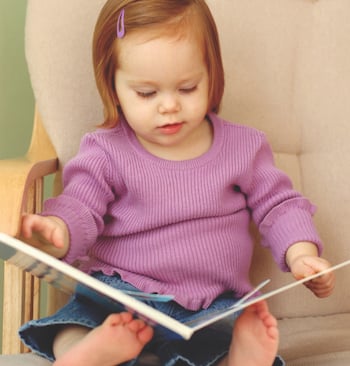Everyone Loves a Good Story, Including Your Toddler

Toddlers love stories. They may enjoy repeating a funny story about what happened at their birthday party, or listening to a story about the day they were born. Storytelling activities teach children about what makes a story before they actually learn to read. They can hear new words, learn the order of events, build listening and language skills, and find out more about what interests them.
Outside the home, there are many opportunities for storytelling:
- Libraries offer story times, divided by age groups. Stories are exciting when told aloud to a group, and toddlers are often asked questions by the group leader about what they are hearing. Some may offer a music and movement element.
- While children are waiting for food in a restaurant or for an appointment to begin, they may be ready to listen to a story or help a parent create one to tell: “Look at the fish in that fish tank. Should we name them?”
- Riding in a car or bus provides a wonderful opportunity for parents and children to talk about what they’re seeing: “I see a man and a dog. Do you think they’re going to the park? What do you think they’ll do when they get there?”
At home, parents can turn moments of their day into story time:
- Children are natural storytellers when they’re engaged with toys or in other imaginative play. Introduce an idea for a story — “Where is this train going today?” — and let your child take it from there.
- Paging through photo albums can trigger real-life stories. Children may enjoy hearing about what their parents’ or other relatives’ lives were like growing up. Simple stories about where you’ve traveled or people you’ve seen can give your child a broader view of the world.
- Quiet, relaxed moments, like snuggle time, before naps, or bedtime, are great story times, too.
To keep your child interested in the story, vary what you’re doing. Begin the story, but ask your child to add details. If a child is stuck, provide choices: “Is that the mommy fish, the daddy fish, or a baby fish?” If your child has a strong interest area – the family pet for example — create a story about it together or tell the story about how the pet came into the family.
Storytelling helps toddlers build their natural love for stories into pre-reading skills. It’s an engaging activity that’s ideal for the two of you to enjoy together. Soon, your toddler may be able to tell a complete story on their own, from beginning to end.
This article was adapted from CELLpractices, a publication of the Center for Early Literacy Learning. For more helpful resources, visit earlyliteracylearning.org/
